Pint of Science Festival
A review of the Pint of Science Festival, at the Foundry Brew Pub, Canterbury

Pint of Science is an international science festival across 24 counties that each May delivers learning events in pubs, bars and breweries. The many events cover different science subjects, with each event typically having three topics all with different researchers from local universities. This year’s events ran from 22 to 24 May, with two events being held at the Foundry Brew Pub, Canterbury. This is a reduced account of the second 2023 event at this venue. The three topics were;
- Using phonetics to help language learning.
- Hops and disease resistant crops.
- Artificial intelligence and comedy.
Using phonetics to help language learning. Simple sound exercises will make learning a language so easy!
Presented by Gabrielle Emson (PhD Researcher - School of Cultures & Languages)
The talk began with an assessment of the current state of foreign language learning in the UK. National strategy outlines that all primary school children be taught a modern foreign language, however children are coming to secondary schools at very different levels due to a lack of implementation of this strategy. In fact there has been a decline of language learning since 2002, and as a country we are not competitive as we should be. In fact it has been estimated that the UK loses £48b a year because of lack of language skills.
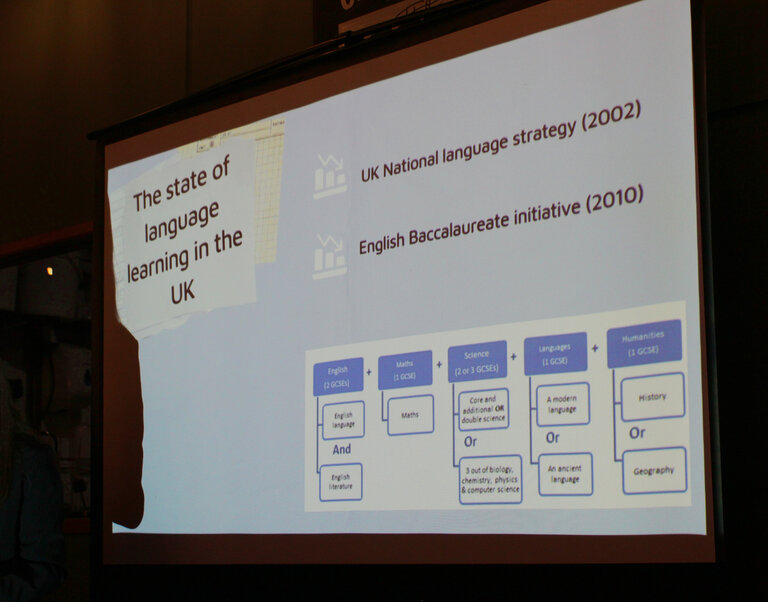
Gabrielle explained that using phonology to examine what sounds are different and which are similar in, for example, French is an aid to learning. “Some of our sounds do not exist in French, which is my speciality, most strikingly the Th sound which can tend to be spoken by a French person as Zee. Also, for example, French does not have the Ee sound as we use in the word sheep.
"Of course some features of French don’t exist in our language. We should learn these other sounds as soon as possible as they can be difficult to learn later on.
"I promote an analytical pronunciation approach looking at the placing of the lips and tongue. Thinking about the physical side of pronunciation, French tends to be concentrated and focused at the front of the mouth but English is more relaxed”.
The meeting was then guided through some spoken exercises using English words to access the authentic pronunciation of French words. She explained “The phonetics of a language is the study of its actual source, rhythm and tone whereas phenology is the comparative study of two languages to further learning, and yes spoken is different to written but they are tied together”.
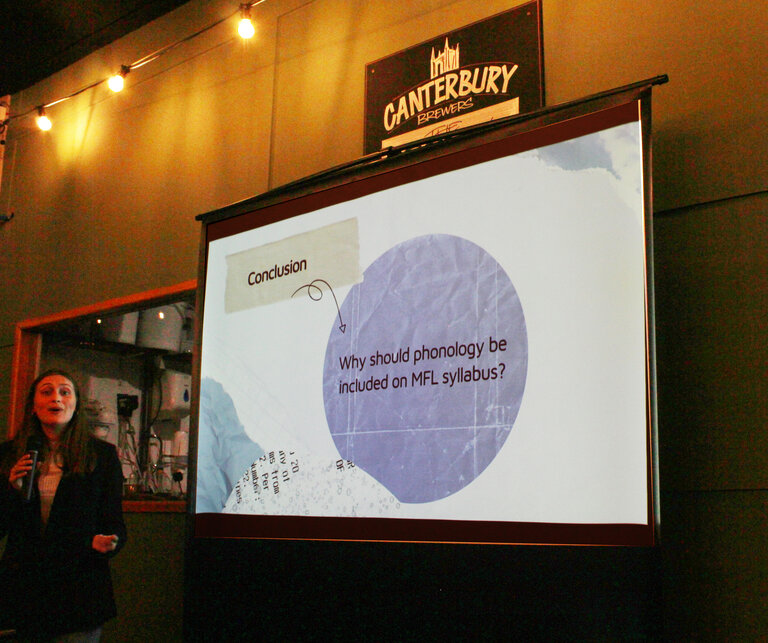
Hops and disease resistant crops. The next generation.
Presented by Helen Cockerton (Research Fellow, Kent University) and Klara Hajdu (PhD Plant Genetics working at Wye Hops)
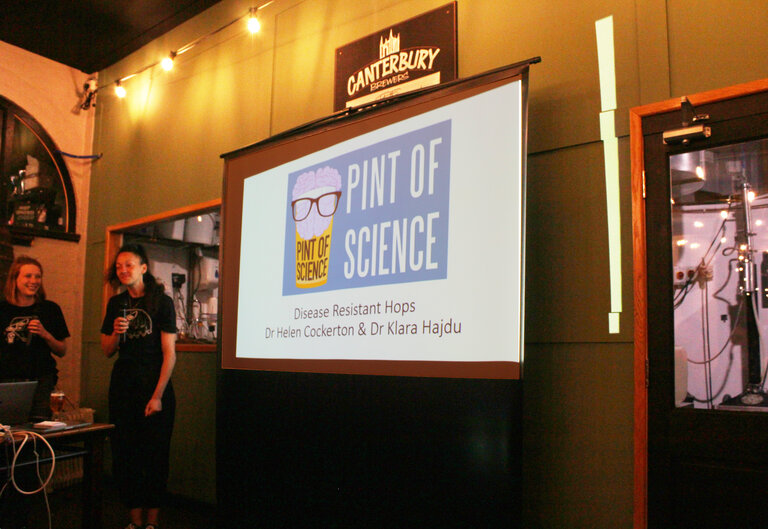
“Hops, which are tall perennial climbing plants, began to be used in British beer making in the 1500s, a century later they became an essential ingredient and a great many hop farms were started here in almost every region. The initial main purpose of hops was to make beer less perishable plus it imparted a new bitterness of flavour. Today these flavours have expanded beyond just bitterness to tropical fruits, spices, grass, pepper, pine like, woody, leather, and many other flavours and aromas. Their purpose is to make us happy”.
“The hop plants themselves are either male or female, and it is the hop cones from the female plants that are used in brewing”.
Klara, who works for Wye Hops, defined their work goal as creating new varieties for brewers with new flavours and aromas. They are currently using new techniques for this process which previously involved many trials and took 10 to 12 years to develop a new variety.
“Using genetic markers we can reduce this time – that’s the theory. We do need to be mindful of disease resistances. Pathogens can wipe out entire hop gardens, so hop breeding needs to be robust. Some diseases are airborne others colonise plants from the soil.
"The main threat is powdery mildew called verticillim wiet – it has tiny fruiting bodies and can easily lead to crop destruction. It is quite host specific and can adapt the protein on the outside of itself to avoid a plants defences – it is an arms race.
"We look at the DNA from two parent plants, and taking this DNA into account can lead to a product. Molecular breeding acts on flags so we don’t have to wait so long. We may mix a susceptible male with a resistant female. Analysising the DNA from these and exposing perhaps 100 offspring to mildew we are able to identify which bits of the DNA is making the new plants resistant.
"We are not identifying individual DNA molecules but rather groups. When a new resistant male plant is produced and paired with a female plant the resultant female offspring is then mated back again with the father plant – a bit like Game of Thrones”.
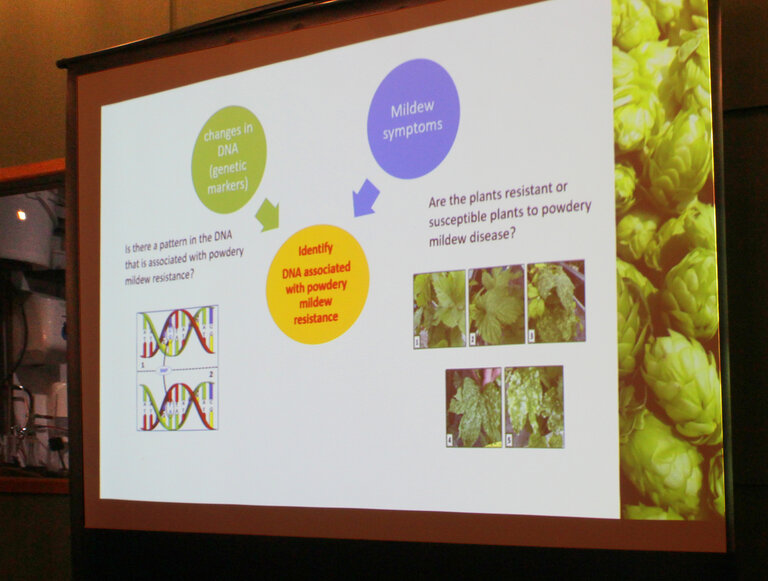
We then had an audience participation demonstration of DNA extraction from some strawberries. The steps were; mashing them then adding 100ml water with some washing-up liquid to break open the cells, a tea spoon of salt to make the DNA fall out of the solution, and then some rubbing alcohol. The mixture was swirled around and a gooey clump appeared – the strawberries’ DNA.
Artificial Intelligence and comedy. How good is AI at telling a joke? Let’s put it to the test!
Presented by Tommy Pargeter-Grey (Assistant Lecturer - School of Computing)
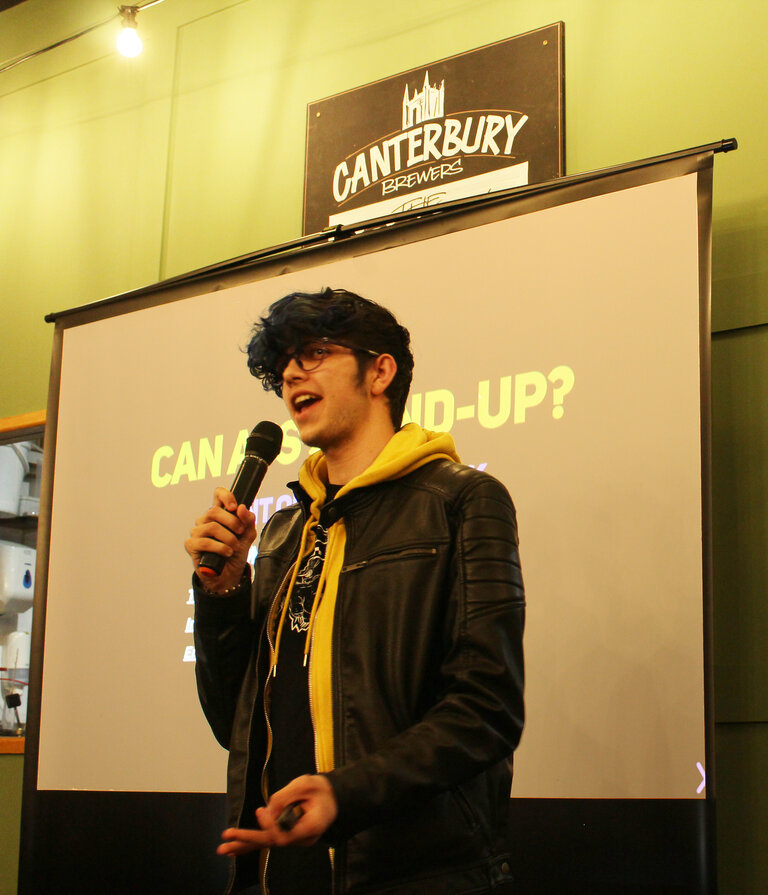
Tommy’s thesis is looking at the results of Open AI, https://openai.com/, and its ability to produce humour. Although the AI is free to use, its actual workings are commercially protected.
Tommy said, “So it is like putting a small rubber duck into a black box, shaking it around then opening the box to discover it is now super-duck. It acts somewhat like the auto-correct and auto-complete on various devices. My hobby is stand-up comedy and I often appear at a venue very near here. I’m known as PPT, Power-Point Tommy. My research focuses on storytelling comedy rather than simple jokes. There is always a divide between audience and performer so to beak that down a little – at my graduation day photos taken with my parents, after a photo of the three of us together my father asked for just individual shots of me with my mum, and then me and him – why?, “well in case we get divorced!””.
After reviewing the different categories of humour and the audience voting on whether certain jokes were AI or not, came the live demonstration using the prompt algorithm via a laptop. The audience was asked for a topic – mildew, then to guess five elements the AI might cover in its humour. Those elements were damp, female organs, wilt, sap, and shower.
The AI’s joke which Tommy professionally delivered was– It’s Tuesday and you’re doing your laundry. You leave it damp for a very short while and now it’s got mildew, it just turns up. How does it do that? It’s like Keanu Reeves. What if I told you that your bathrobe is not from the matrix! This mildew is controlled by sinister secret government organisations, the authorities. I went to war with it with bleach, and won. It’s like discovering your sister is your mother in some weird soap opera. But really, it’s like the culmination of dating, a damp and mysterious experience.
In concluding Tommy said, “So, Is AI invasion or replacement? I think it’s co-creation and can help comedians. We are safe from it, and it doesn’t have the ability to refuse instructions. It helps us and aids us, that’s now and the future. However we are still somewhat in the OMG! what’s happening stage? There are legal cases in the United States which are entering new territory about copyright and authenticity. In addition to writing AIs can also produce art works, yes they are good and have uses but they will never replace human creativity and originality. For example I might use one to generate a background for when I play dungeons and dragons. Yes, I have performed AI jokes as part of a narrative to audiences which I do declare at the time, I used it once during an onstage sketch where I was slowly taken over by an AI”.
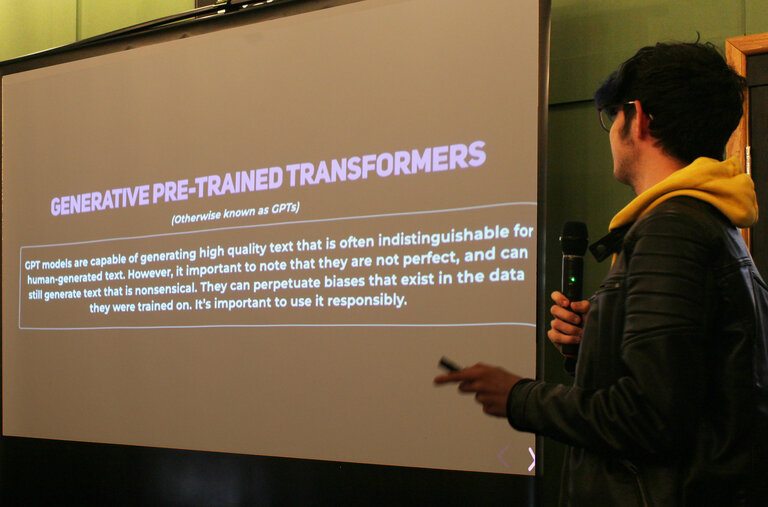
This event was a treat to attend. There was a charge, but events like this confirm that pubs are meeting places and continue to be used by many diverse groups with various agendas, purposes, and forms of entertainment, and long may this continue.
The Foundry Brew Pub brews under the name of Canterbury Brewers, which should not to be confused with Canterbury Ales which is based outside of Canterbury. The cask ales available during the event were Foundryman’s Gold 4% and Torpedo 4.5%. There is often a third ale available, plus it also has its own craft beers and gins.
Published: 29th May 2023.

